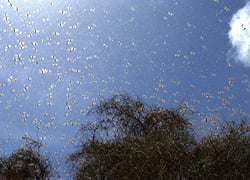A swarm of locusts has infested parts of Somalia's self-declared autonomous region of Puntland in the northeast, destroying crops and other vegetation, officials told IRIN on 27 June.
"There are millions of them and they are spreading to most of the region's farmland," said Muse Gelle, governor of Bari region. "There had been reports of locusts for about a week but the main body appeared three days ago and is eating anything that is green."
Abdurahman Abdulahi, a senior research officer at the Desert Locust Control Organization for Eastern Africa, told IRIN the group had received a report of a locust outbreak in the area.
"We received the information this morning and we are discussing and trying to see what can be done in consultation with FAO [UN Food and Agricultural Organization]," he said from the Ethiopian capital of Addis Ababa.
Graham Farmer, the FAO-Somalia officer in charge, said his agency had a team in the area monitoring the situation.
The worst affected areas were Kala-Beyr, Karin, Yalho and Dhub in Bari region. Said Omar, 70, a farmer in Kala-Beyr, 60km south of Bosasso, Puntland's commercial capital, said the locusts had destroyed his farm and those of his neighbours.
He said these locusts, locally known as Luga Case [red legs], were the most destructive type. "We have not seen this type of locust in over 20 years," he said. "There are so many that in some areas they blocked out the sun.
"I have lost all my crops [fruit and vegetables] worth thousands of dollars," said Omar. He said many of the small farmers were about to harvest when the swarms of locust hit three days ago.
Omar said many farming families would require help to survive. "They have nothing else. All their income came from what they could take to the market."
Gelle said the effects of the infestation were already being felt in Bosasso, where prices of fruit and vegetables had gone up dramatically. "I am told that the prices have gone up as much as 100 percent," Gelle said.
Gelle said the locust swarms were expected to reach Bosasso soon. "They have been seen less than 25km away," he said. "We don’t have the means to deal with this on our own. We need international help."
ah/mw
This article was produced by IRIN News while it was part of the United Nations Office for the Coordination of Humanitarian Affairs. Please send queries on copyright or liability to the UN. For more information: https://shop.un.org/rights-permissions





